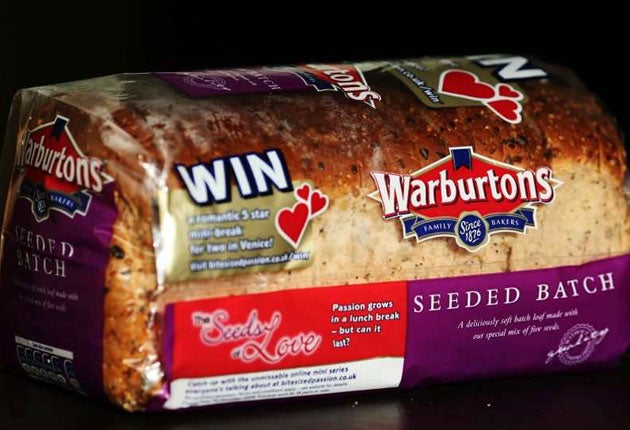Warburtons warned over salty loaf
Britain's biggest baker puts customers at greater risk of heart disease

Britain's biggest baker, Warburtons, is selling bread with up to 20 per cent more salt than rivals, putting its customers at greater risk of heart disease, an investigation by The Independent has found.
Some loaves made by Warburtons – the UK's biggest food brand after Coca-Cola – have half a gram of salt per slice, meaning that a five-year-old child would reach their safe limit from eating three sandwiches.
Salt raises heart pressure which is the biggest cause of heart attacks and strokes. Campaigners say lowering levels would save 16,500 lives a year – a third of the deaths from smoking. A further 16,500 people would be prevented from having debilitating non-fatal heart attacks and strokes, according to the pressure group Consensus Action on Salt and Health (Cash).
Under pressure from the Government's Food Standards Agency (FSA), manufacturers have been reducing salt levels. But some have been responding quicker than others.
In a survey of Warburtons' best-selling loaves, four had salt levels ranging between 1.13g and 1.18g per 100g. A further seven products scraped under an official target for salt reduction.
Overall, Warburtons had an average of 1.08g salt, 5 per cent more than Kingsmill, 12 per cent more than Tesco, and 20 per cent saltier than Sainsbury's, which has been praised for improving cardiovascular health.
Warburtons, a privately-owned brand from Bolton, Lancashire, promotes itself as a wholesome, family-run baker. Warburtons defended its record, saying it had cut salt by "over 30 per cent in recent years" and would hit targets by their deadline in 2010.
The campaign group Consensus Action on Salt and Health (Cash) urged it to immediately make steeper cuts to improve its customers' health. Three million people eat Warburtons bread every day. "Bread is the major source of salt in the diet," said Cash's chairman, Professor Graham MacGregor, an NHS doctor who treats heart patients at St George's Hospital, south London. "It is vital that bread manufacturers take a really responsible role.
"There are no technical problems in producing bread with less salt and Warburtons and the branded products have much higher levels than the supermarket breads. It's their responsibility to get that down," he added.
Manufacturers use salt to improve taste and disguise the use of cheap ingredients. 75 per cent of sodium in the diet comes from processed food.
Cash says the anti-salt drive could become one of the most successful public health campaigns ever because it requires no action by the public. But the FSA has been accused of being too timid in setting targets and lowered some in 2006 after lobbying from Nestlé, Tesco and Waitrose, among others.
The FSA recommends adults eat no more than 6g salt a day, while the World Health Organisation believes the figure should be 5g a day and scientific studies suggest 3g. Current consumption is 8.6g, meaning adults are eating about three times more than they should. Some young men who consume lots of takeaways and other salty products are eating five times as much.
Under the FSA 2010 targets published in 2005, bakers should put in no more than 1.1g salt per 100g bread.
This month The Independent checked 84 bagged breads made by the three largest branded bakers, Warburtons, Hovis, and Kingsmill, and the supermarkets Tesco, Asda, Sainsbury, Waitrose and Marks & Spencer.
Based on a survey of 13 best-selling loaves, Warburtons had the highest salt level, with four over the 2010 target, two on 1.1g and five on 0.8g – just below the target but well above other breads. Only two breads, both wholemeal, were significantly below targets.
In general, branded breads had more salt than those made by supermarkets. Hovis' white granary bread had 1.4g of salt per 100g – the highest in the survey.
Warburtons said it was "continually reducing" the levels of salt in its products. In a statement it said: "Warburtons has agreed to meet an average industry target of 1.1g of salt per 100g of bread by 2010, and is on track to do so."
Kingsmill agreed that salt was "of huge consumer importance" and Hovis said "most" of its products already met 2010 targets.
Salt in bread: How brands compare
Average salt content per 100g bread. Loaves surveyed October 2008. Recommended daily salt intake is 6g
Warburtons 1.08g
Hovis 1.07g
Asda 1.05g
Kingsmill 1.03g
Tesco 0.96g
Waitrose 0.94g
M&S 0.92g
Sainsbury 0.86g
Join our commenting forum
Join thought-provoking conversations, follow other Independent readers and see their replies
Comments